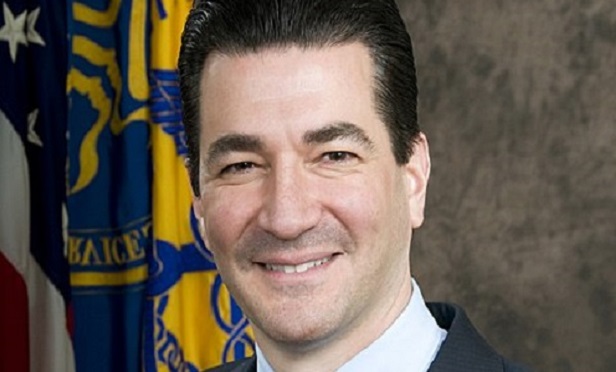
 Scott Gottlieb (Photo: FDA)
Scott Gottlieb (Photo: FDA)
A "rigged payment scheme" between drug plans, insurers and pharmaceutical companies has blocked access to less-expensive versions of some of the most costly drugs in the U.S., the head of the Food and Drug Administration said Wednesday.
FDA Commissioner Scott Gottlieb aimed particular criticism at giant pharmacy benefit managers that contract with health plans to administer coverage of drugs, saying the industry's tactics have stymied cheaper copies of expensive biotechnology drugs. Known as PBMs, the companies include Express Scripts Holding Co., CVS Health Corp. and UnitedHealth Group Inc.'s OptumRx unit.
"Consolidated firms — the PBMs, the distributors, and the drug stores; team up with payors," Gottlieb said in prepared remarks at a conference in Washington that was organized by America's Health Insurance Plans (AHIP). "They use their individual market power to effectively split monopoly rents with large manufacturers and other intermediaries; rather than passing on the saving garnered from competition to patients and employers."
(Related: Drug Industry Lunacy: Who's to Blame?)
The speech is some of the Trump administration's broadest criticism yet of the health care industry amid an ongoing debate about the cost of drugs and company-led efforts to and deal with rising health care costs. Warren Buffett, whose Berkshire Hathaway Inc. has joined with Amazon.com Inc. and JPMorgan Chase & Co. to look at how the companies might address the issue, has called health costs a "tapeworm" eating at the inside of companies.
While the FDA has little or no power over PBMs, Gottlieb's remarks make clear that administration health officials place the blame for high drug costs not just on biotechnology and pharmaceutical companies, but also on other parts of the complex medical supply chain.
Express Scripts shares fell 1.6% to $73.42 on Wednesday in New York, while CVS declined 0.2% to $67.51, and UnitedHealth shares advanced 0.5% to $227.27.
Threatening the Market
Gottlieb said the arrangements between PBMs, drugmakers, insurers and distributors threaten the new market for what are known as biosimilars, cheaper versions of complex biotechnology drugs. Unlike pills, biotechnology drugs are made from living cells, are injected or infused, and have advanced the treatment of many diseases. They've also come with record prices.
Biosimilars were meant to be a less costly alternative to the products, and Gottlieb called them necessary for a competitive market that works for patients. A 2010 law created a way for the FDA to approve the drugs and help doctors and patients decide how to use them. Their uptake has been slowed by what Gottlieb said were opaque contracts that favor the older, more costly drugs.
He described a system by which makers of the biotech drugs make exclusive arrangements with PBMs and insurers, who agree to cover only the old drug in return for rebates or discounts.
"The rigged payment scheme might quite literally scare competition out of the market altogether," Gottlieb said. "I fear that's already happening."
Both CVS Health and Express Scripts said that they have aggressively advocated for bringing biosimilars to the market. CVS said it was quick to include biosimilars on its list of covered drugs, resulting in substantial savings.
Drugmakers are to blame for the lag in getting biosimilars to the market, Express Scripts said. "They continue to be delayed by drugmakers who engage in non-stop litigation and enter into settlements that delay their availability in the U.S.," said Jennifer Luddy, a spokeswoman for the company.
AHIP, which represents insurers, blamed drugmakers for setting initial high prices for the biotechnology drugs, and then raising them as competition nears.
"Because of such pricing practices, the overall health care system as well as the consumers who need these important therapies won't reap the much needed savings from biosimilars," said Kristine Grow, a spokeswoman for AHIP.



